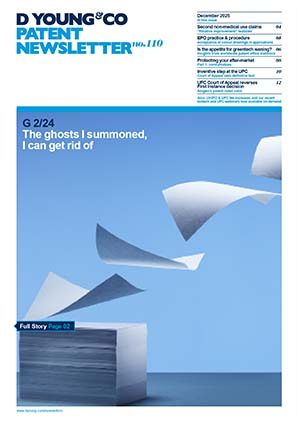J0009/18: four substantial procedural violations and a legal inaccuracy
Appeals against the Receiving Section at the EPO tend to be few and far between. Nevertheless such appeals tend to relate to procedural matters and can deal with complex matters of law. In this case, the Board of Appeal identified a total of four substantial procedural violations that had occurred making this the ideal case for a refresher on matters relating to further processing, and re-establishment.
Background
EP15191492.6 was filed on 26 October 2015. It published, together with the search report, on 11 May 2016. Consequently, it was necessary to pay the examination and designation fees within six months of this date (11 November 2016), as well as respond to the written opinion appended to the search report. Despite a reminder of this fact being given to the applicant, the fees were not paid on time.
On 22 December 2016, the applicant was informed that due to the failure to pay the fees on time, the application was deemed withdrawn. The applicant was reminded that further processing could be requested within a two-month period of notification of the communication that the fees had not been paid (thereby providing a due date of 01 March 2017).
On 03 March 2017 (two days after the deadline), the applicant attempted to complete the omitted acts, and pay the further processing fee.
On 15 March 2017, the Receiving Section issued a communication under Article 113(1) EPC to say that the omitted acts had not been completed in time. The applicant was invited to file comments within two months before a final decision was taken.
No further communication was issued by the EPO. On 21 June 2017, the fees that were paid in an attempt to complete the omitted acts were refunded. On 15 December 2017, the applicant then attempted to request re-establishment of the right to request further processing. The explanation given was that an experienced assistant had been given responsibility for the application and, despite instructions to respond to the search opinion, had not done so. This error had only recently been discovered (in November 2017). Oral proceedings were requested if the Receiving Section were minded to refuse the request.
On 07 February 2018, the EPO responded with a decision that:
- the opinion provided on 15 March 2017 had become final since no timely reaction had been forthcoming from the applicant
- the request for re-establishment of right was not an available means of redress.
On 28 February 2018, the applicant filed an appeal against the decision dated 07 February 2018.
First substantial procedural violation – oral proceedings
According to Article 116(2) EPC, oral proceedings must be arranged before the Receiving Section at the request of the applicant only where the Receiving Section considers this to be expedient or where it intends to refuse the European patent application. The Receiving Section could refuse the request. However, the applicant has a right to a decision on this point.
In this case, the request for oral proceedings was neither acknowledged nor acted upon by the Receiving Section. Instead, a decision on the request for re-establishment was simply taken immediately.
As noted by the Board of Appeal “Not deciding on a request put before the Receiving Section constitutes a substantial violation of the applicant’s right to be heard”.
Second substantial procedural violation – right to be heard
Although related to the first violation, the Board of Appeal also agreed with the applicant/appellant that since the decision had been issued without the applicant having had the opportunity to comment (that is, on the decision to refuse the request to the re-establishment of rights), this contravened Article 113(1) EPC and so was a second substantial procedural violation.
Third substantial procedural violation – insufficient reasoning
The Board of Appeal also agreed with the applicant that the reasoning as to why the re-establishment of rights was not accepted was simply a repetition of the summary wording given by the Receiving Section elsewhere “re-establishment of rights is not an available means of redress in such a situation”.
Fourth substantial procedural violation – responsible employee
The Board of Appeal noted that the communication from the EPO failed to identify the EPO employee who was responsible for the communication as required by Rule 113(1) EPC. The Board of Appeal considered whether the exception under Rule 113(2) applied (this relates to documents prepared by computer), but they considered that it did not.
And a legal inaccuracy
As if to really make their displeasure known, the Board of Appeal also pointed out that the impugned decision (of 07 February 2018) was also legally wrong. The Board or Appeal commented that the communication of 15 March 2017 was only a communication informing the applicant that the Receiving Section intended to reject the request for further processing. Since it did not note the loss of rights (Rule 112(1) EPC) and since it was not a decision (Rule 112(2) EPC), there was nothing to “become final” as mentioned in the decision of 07 February 2018.
Likelihood of success
Although not part of the decision, it is worth considering whether the request for re-establishment of rights is likely to be successful. In summary, the applicant’s representative indicates that (due to medication) an assistant incorrectly entered into one diary system that the deadline had been met, while they also forgot to inform a senior member of staff that the deadline existed in the first place. When the loss of rights communication was received this was also not entered into the system although the explanation for this is more vague. The applicant’s representative suggests that this could have been done by the assistant to hide their mistake or could also have been due to confusion caused by the assistant’s medication. The applicant then states that the assistant tried to initiate further processing themselves and that this was also hidden from senior members of staff.
It is important to note that the request for re-establishment relates to the period for requesting further processing. To some extent, the events surrounding the other (prior) deadlines are largely irrelevant. The applicant’s representative has indicated that the assistant did not report this deadline, but is unclear as to whether this was unintentional (a consequence of the medication) or intentional (to avoid disciplinary proceedings).
Case law (J5/80 for instance) states that routine tasks (which includes the noting and checking of due dates) can be delegated to assistants and that the same strict standard of care is not required. However, there is a requirement that the assistant is carefully selected, duly instructed, and periodically supervised. There could be some argument that these requirements are met – although the degree of supervision is not known. Separate to this is the question of whether some kind of force majeure could be said to be in operation. Could the error have reasonably been foreseeable? The applicant’s representative contends that the side effects of the medication were unknown to them. If true then, again, this could result in a successful request for re-establishment although the full facts are not known.
Summary
Of course, the entire fact that it is difficult to comment on the likelihood of success based on the evidence provided so far underlines the need for applicants (and their representatives) to have the chance to comment on findings of the Receiving Section (and other divisions of the EPO). Indeed, oral proceedings would have provided an excellent opportunity for the Receiving Section to discuss such a complicated topic, investigate the specifics of what had happened, thereby underlining their importance in these kinds of proceedings.


